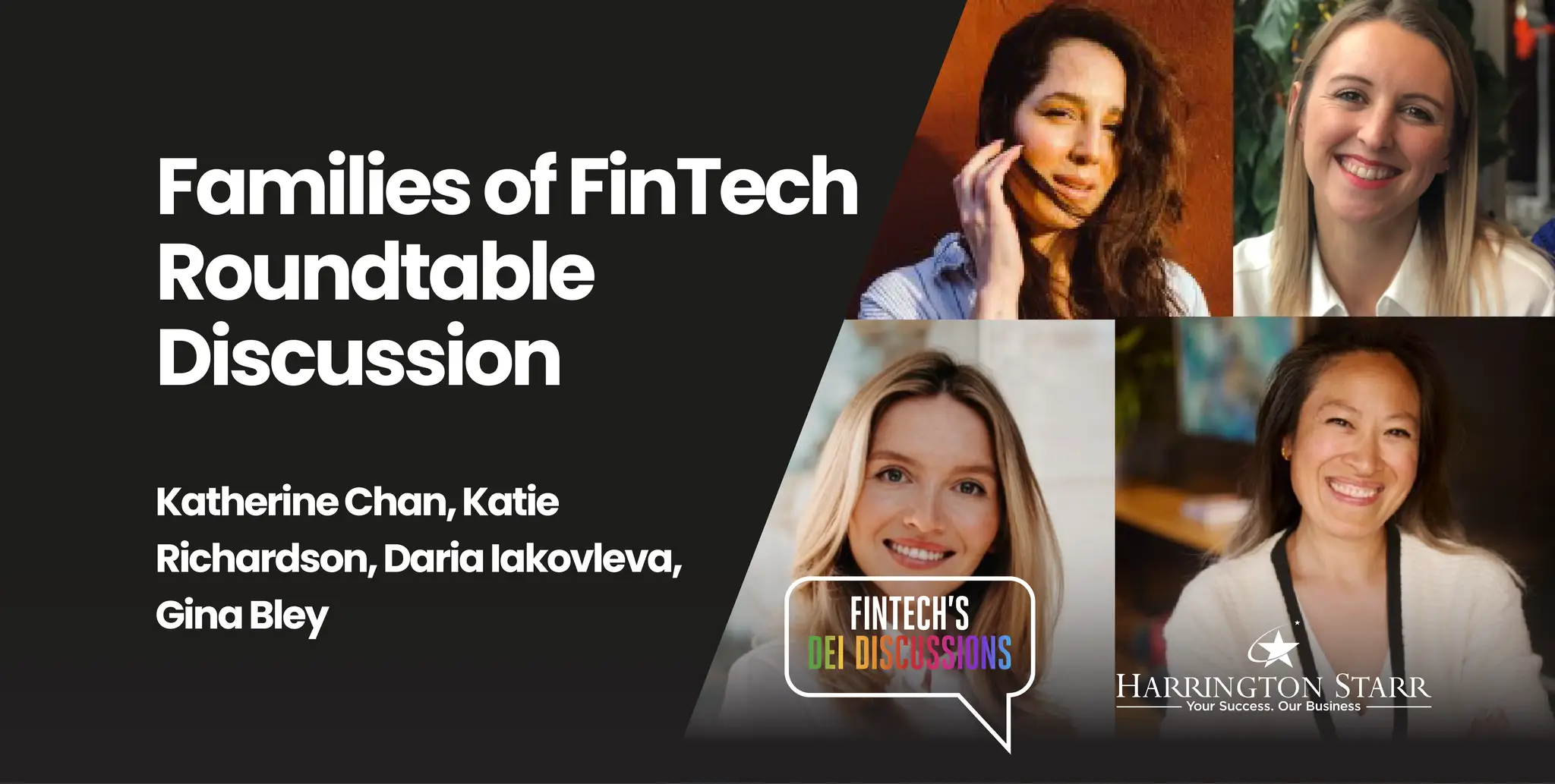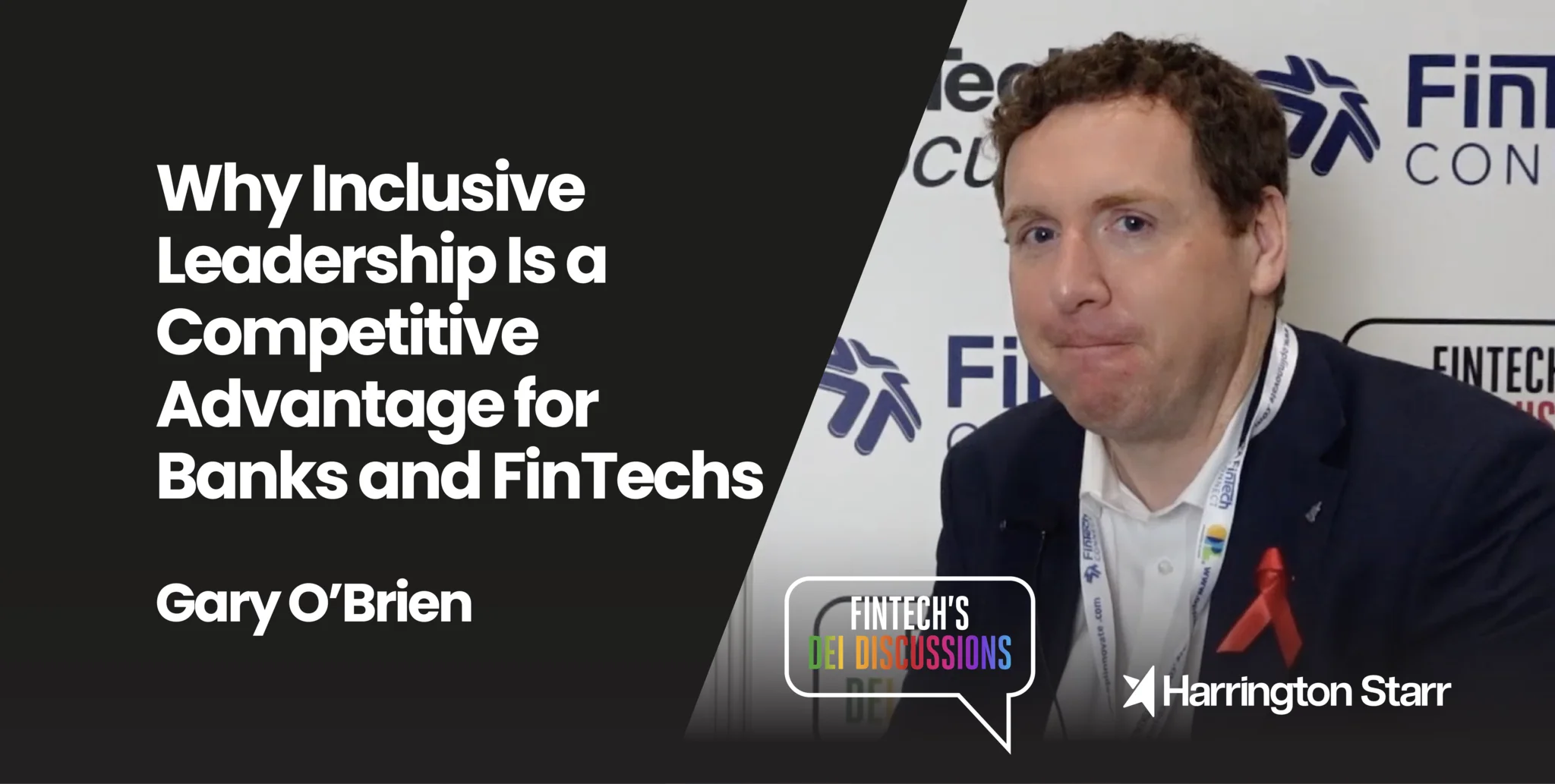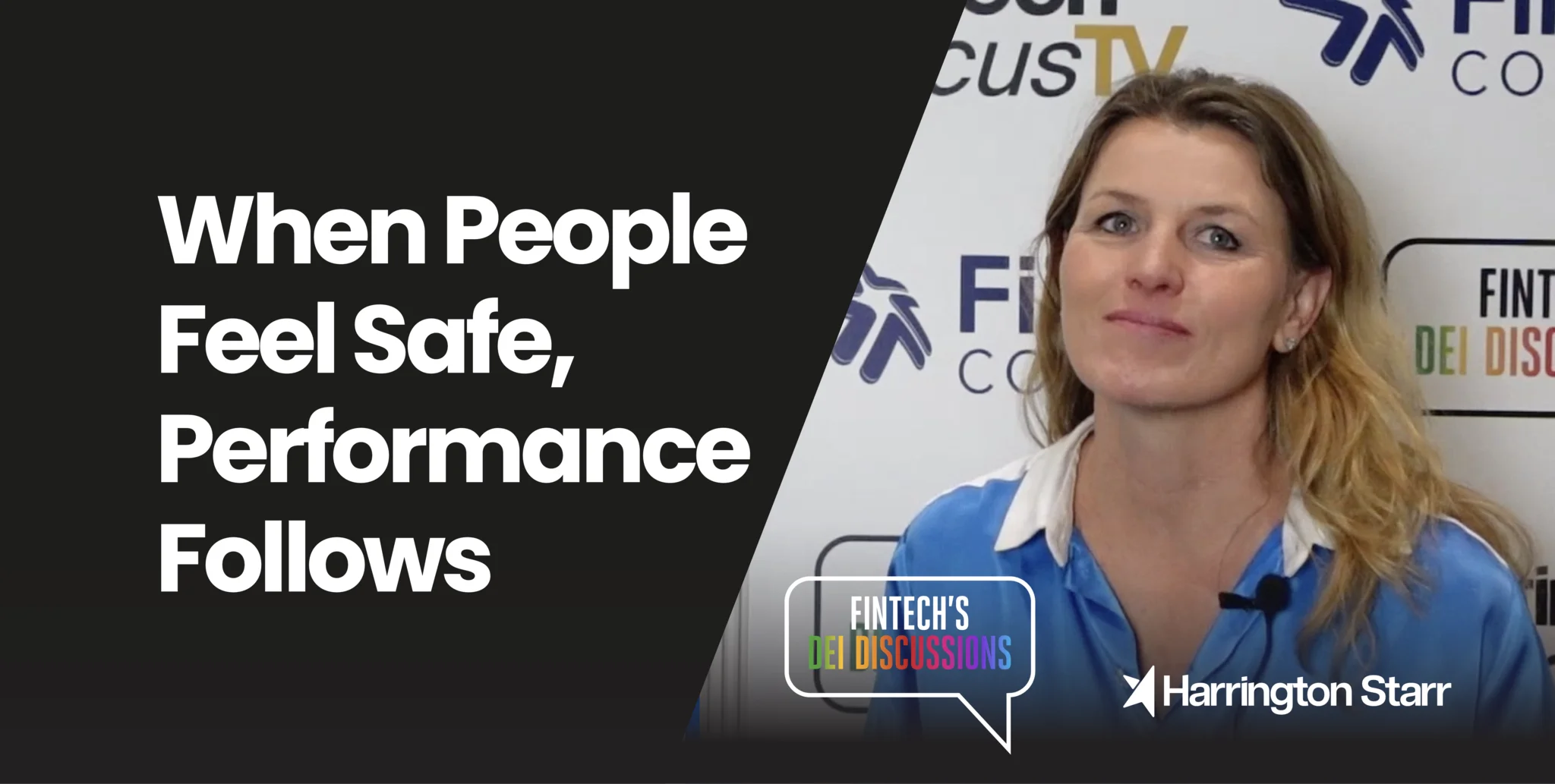How Flexibility, Trust and Support Can Transform Careers in the Industry
In a special Families of FinTech roundtable episode of FinTech’s DEI Discussions, host Nadia welcomed four guests to share their honest experiences as working mothers in the financial technology sector. The conversation featured Katherine Chan, Founder and Chief Executive Officer at Juice; Katie Richardson, Freelance Marketing Consultant; Daria Iakovleva, Head of Marketing (Interim) at Juice; and Gina Bley, Marketing Contractor.
This roundtable brought together four women with different paths back into the workplace, all connected by their work with Juice and by their shared commitment to showing what genuine flexibility and inclusion can look like in practice. Their stories revealed the challenges of returning to work after parental leave, the reality of juggling career and family, and the way trust-based, flexible working environments can help talent thrive.
As a FinTech recruitment business, Harrington Starr knows how important it is to build workplaces where exceptional professionals can succeed without sacrificing other priorities in life. This discussion offered valuable insight into how employers in the FinTech sector can retain talent and close skills gaps by embracing flexibility, understanding, and trust.
Flexibility in the Workplace: Setting the Scene
The conversation began with Katherine Chan explaining why flexibility had been so vital to her own journey. When she started Juice, her son was only one year old. Balancing the demands of a young child and launching a start-up was challenging, but the flexibility she had was the reason she could make it work. Without it, she said, it would have been impossible to take Juice through its growth and achieve key milestones in her career.
Katherine is keenly aware that not all workplaces provide flexibility in the same way. That’s why she wanted this discussion to shine a light on the issue and show that flexibility does not mean a loss of productivity. In her view, productivity is actually enhanced when people feel good both in and outside of work. Life is not just about work, and when a workplace can fit harmoniously around a person’s life and priorities, they can perform at their best.
Nadia agreed, adding that many employers fear the word “flexibility” without recognising that it can mean different things for different people.
What Flexibility Looks Like in Practice
Gina Bley described flexibility as being able to work during set times but starting an hour or two later if needed, or coming into the office on days that fit her life rather than on a rigid schedule. Since becoming a mother, she said she could not see herself returning to a five-days-a-week office job.
Daria Iakovleva emphasised that flexibility is about genuine support and understanding. While many companies claim to be flexible, she pointed out that the reality often looks very different, especially in the UK. Too often, new mothers are expected to perform at the same, or even higher, levels without the necessary support from their teams. With Juice, however, she has felt the flexibility in action, describing it as a core value of the company. Even when her baby could be heard crying in the background during calls, her colleagues were understanding and encouraged her to continue without embarrassment.
Katie Richardson’s experience echoed this. Without family nearby, she said, returning to work would have been far more difficult without a flexible approach. Being able to change office days week to week, depending on childcare availability, allowed her to deliver in her role while caring for her children. She stressed that this trust made all the difference in helping her reintegrate into work after maternity leave.
The Myth of Having It All
Nadia introduced the next topic by recalling something Katie had once said: “We are told to live in a world where we can have it all, but does it give it all to us?”
Katie explained that although it can seem like some people are “mastering it all,” there are always sacrifices or choices involved. Deciding whether to return to work full time, whether childcare is affordable, or whether to stay home are all challenging decisions. She admitted she hadn’t anticipated the emotional and mental load of trying to balance everything, describing a constant feeling of being switched on without giving 100% to any one thing. She argued that the idea of “having it all” can put damaging pressure on parents.
Gina related her own experience of navigating childcare. She recalled the pressure of having to consider nursery places almost immediately after her baby was born, despite feeling nowhere near ready to leave her child in someone else’s care. Without family in London, she and her husband had to pursue nursery options. It wasn’t until her daughter was nine months old that she felt ready. At that point she began job hunting but wanted part-time work, which proved difficult to find. Eventually she took a freelance role at Juice, appreciating the flexibility to work part-time and manage her own schedule.
Daria reflected that becoming a mother forced her to be more efficient and intentional with her time. She had to shift from striving for perfection in every role to splitting her time clearly between work and parenting, and to be fully present in each. One of her biggest lessons was learning to ask for help, both at home and at work. She came to see support as a strength rather than a weakness.
Katherine agreed with all of these points, reiterating that “having it all” is a myth, but that flexibility can bring people closer to achieving balance. For her, the focus should be on output rather than a fixed working format.
Confidence and the Return to Work
The conversation then turned to confidence. Nadia spoke openly about losing confidence after having her children, even though she was actually more capable than before.
Gina shared that she also experienced a dip in confidence, especially when she was late to the office due to childcare demands. A colleague once told her they enjoyed working with parents because of their time efficiency, which helped rebuild her confidence.
Katie contrasted two return-to-work experiences. After her first child, she returned to a workplace with no support, which was a difficult and demoralising experience. After her second child, she returned to a flexible and trusting environment with Juice, which gave her the belief that she could deliver while managing parenting responsibilities.
Katherine pointed out that fixed attendance requirements can damage confidence, particularly when parents compare themselves to colleagues without caregiving responsibilities. Removing these rigid expectations helps relieve pressure and allows parents to focus on delivering results.
Daria explained that she initially compared herself to her pre-parenthood self, measuring progress by the number of achievements and becoming frustrated when she couldn’t match her old pace. Over time she reframed her expectations, recognising that it was not about doing more, but about doing what mattered most and trusting her expertise.
Building a Culture of Trust and Adaptability
For Katherine, demonstrating trust in employees means setting clear expectations for what needs to be delivered, but allowing people the freedom to decide how and when to do it. She believes in embedding flexibility and adaptability into company values so that the whole team supports these principles. This reduces guilt and pressure, especially for those working in unconventional formats.
She also suggested that workplaces could introduce formal return-to-work programmes for mothers, potentially through job sharing or other structured approaches. This would encourage women who might be hesitant to apply for demanding roles to return to the workplace in a supported way.
Katie agreed that empathy and understanding are essential.
Final Thoughts for Parents Returning to the FinTech Workplace
As the discussion drew to a close, Nadia invited each participant to share a final message for anyone concerned about returning to work.
Katherine urged women to continue believing in the value they bring and to trust that they can find a workplace that will allow them to showcase their talents. She hopes that greater awareness will encourage more employers to unlock this pool of talent.
Katie reminded listeners that returning to work after having a baby is a major milestone. She advised being kind to yourself and accepting that your perspective will change after having children. There’s no “perfect” time to do it, what matters is having the confidence to get back into it and building a network of support.
Gina acknowledged that life changes dramatically after becoming a parent but encouraged others to know that they can still pursue career goals, even if it takes more time and planning. She stressed that parenthood doesn’t prevent you from changing jobs, moving countries, or starting a business.
Daria said it’s not necessary to have everything figured out. The transition can be messy, but being gentle with yourself, asking for support, and letting go of perfectionism can help you become even more effective in your career.
Lessons for FinTech Recruitment and Retention
This Families of FinTech roundtable demonstrated the real-world impact of flexibility, trust, and empathy in retaining skilled professionals. In the competitive FinTech sector, where demand for top talent in areas such as marketing, product management, data, and technology is high, companies that provide genuine flexibility are more likely to attract and keep exceptional employees.
The stories shared by Katherine, Katie, Daria, and Gina show that flexibility is not a nice-to-have; it’s a business imperative. It enables parents to contribute fully, it improves productivity, and it fosters loyalty. For FinTech employers, listening to employees and adapting working practices is a direct investment in talent retention and long-term success.
At Harrington Starr, we partner with FinTech businesses in London, New York, and beyond to help them find the people who will drive growth and innovation. The experiences discussed in this episode reinforce what we see in the market every day: when companies put trust and flexibility at the heart of their culture, they unlock the full potential of their teams.






